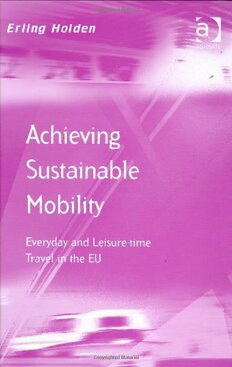
Achieving Sustainable Mobility (Transport and Mobility) PDF
262 Pages·2007·1.32 MB·English
Most books are stored in the elastic cloud where traffic is expensive. For this reason, we have a limit on daily download.
Preview Achieving Sustainable Mobility (Transport and Mobility)
Description:
Sustainable mobility has become the new imperative for transport policy. There have been a number of policy attempts at sustainable mobility globally, such as the development of more efficient conventional transport technologies, the promotion of efficient and affordable public transport systems and the encouragement of environmental awareness. Such policies have so often been presented as prerequisites for sustainable mobility that they are now taken for granted. But are any of these policies really successful? To what extent do they actually contribute (or fail to contribute) to sustainable mobility? Why do some policies succeed and others fail?Using an interdisciplinary approach which brings together various theories and methodologies, this book tests each of these policies - or hypotheses, as the author sees them - with detailed empirical investigations. It also argues that leisure-time travel should be included in any sustainable mobility policies, as it now accounts for 50 per cent of all annual travel distance in developed countries. The book concludes by suggesting fourteen theses of sustainable mobility for the EU and a new model for future best practice.
See more
The list of books you might like
Most books are stored in the elastic cloud where traffic is expensive. For this reason, we have a limit on daily download.
